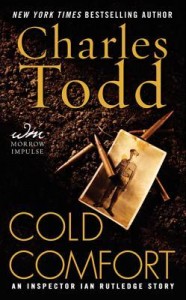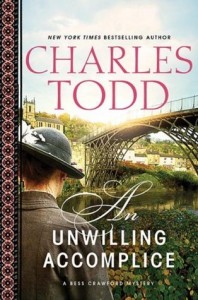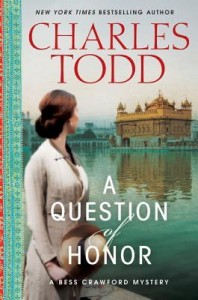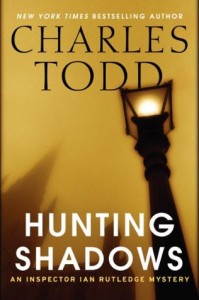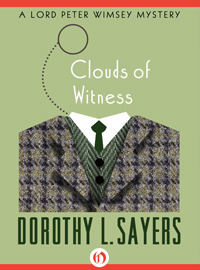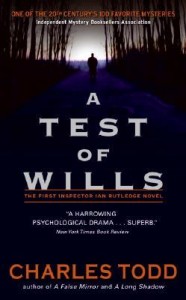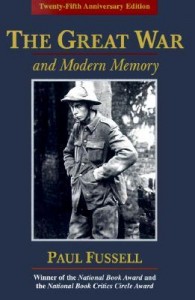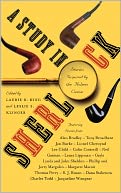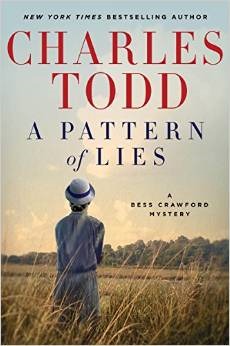 Format read: ebook provided by the publisher via Edelweiss
Format read: ebook provided by the publisher via EdelweissFormats available: hardcover, large print, ebook, audiobook
Genre: historical mystery
Series: Bess Crawford #7
Length: 336 pages
Publisher: William Morrow
Date Released: August 18, 2015
Purchasing Info: Author’s Website, Publisher’s Website, Goodreads, Amazon, Barnes & Noble, Kobo, Book Depository
An explosion and fire at the Ashton Gunpowder Mill in Kent has killed over a hundred men. It’s called an appalling tragedy—until suspicion and rumor raise the specter of murder. While visiting the Ashton family, Bess Crawford finds herself caught up in a venomous show of hostility that doesn’t stop with Philip Ashton’s arrest. Indeed, someone is out for blood, and the household is all but under siege.
The only known witness to the tragedy is now at the Front in France. Bess is asked to find him. When she does, he refuses to tell her anything that will help the Ashtons. Realizing that he believes the tissue of lies that has nearly destroyed a family, Bess must convince him to tell her what really happened that terrible Sunday morning. But now someone else is also searching for this man.
To end the vicious persecution of the Ashtons, Bess must risk her own life to protect her reluctant witness from a clever killer intent on preventing either of them from ever reaching England.
My Review:
The title may be “pattern of lies” but the end result became a design for destruction. While this is a murder story, it is also, and more significantly, a story about the evil that men (and women) do, and man’s (and woman’s) inhumanity to their fellow humans. And that’s what makes this one so chilling. It’s not the original murder, it’s the mob mentality that takes over a small town and very nearly hounds an innocent man to his death.
As we have found out all too often in modern times, the cover-up is often nastier and more costly than the original crime. This particular instance takes that truism to new heights. Or perhaps that should be depths.
Something horrible happened in a small town in Kent. In 1916, the gunpowder mill exploded, killing over 100 men and putting a big dent in explosives production right after the Battle of the Somme. It was a heavy blow for the British Army to lose one of their best producing explosives factories, but it was an even bigger blow for Cranford, the small town that provided the workers for the mill. Not only did most families lose a breadwinner, but the mill’s production was moved elsewhere, and the town never recovered economically.
Kent is near the Channel, so the Army conducted an investigation into the cause of the explosion and the fire that followed it. They determined that there had been no sabotage, by the Germans or anyone else, and that the tragedy was just a terrible accident. At the time, everyone seemed saddened but satisfied.
Bess Crawford visits Cranford in 1918, two years after the tragedy, only to find that someone or something has revived all of the horror and all of the blame-seeking in this village. She visits one of her former patients, Mark Ashton, and his family. The Ashtons owned the mine, and suddenly, out of the blue, someone is conducting a malicious rumor campaign that places the blame for the explosion squarely on Mark’s father Philip’s shoulders. Philip Ashton is arrested for multiple murder while Bess is visiting.
The question is, who started up all the horrible rumors? And why? Who benefits from not just putting Philip Ashton in jail, but also terrorizing his family and even trying to get his poor innocent dog put down? There is a campaign of terror being waged against the Ashton family, and by the point that Bess becomes involved, every single person in Cranford is involved, including the police. Everyone lost someone in that explosion, and everyone has decided to blame the Ashtons for their grief. Whether that blame is justified or not.
Bess, with her dogged determination, follows the trail of heartless evil back and forth across the Channel, from the battlefields of France to the civilian warfare in Cranford. As more and more lies spring up in Cranford, more and more soldiers with even a tangential connection to the original tragedy turn up dead at the hands of their fellow British soldiers.
It is up to Bess, with a little help from her father and her network of former patients in the Army to track down the horrible truth – before it is too late for both Philip Ashton and for Bess.
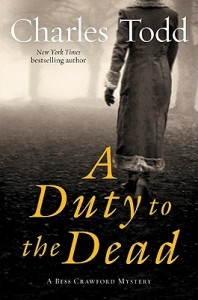 Escape Rating A: I loved this book, but I don’t think it’s a good place to start the series. If you love historical mysteries or the World War I period, A Duty to the Dead would be a much better starting point.
Escape Rating A: I loved this book, but I don’t think it’s a good place to start the series. If you love historical mysteries or the World War I period, A Duty to the Dead would be a much better starting point.
But I love Bess Crawford. So often in historical fiction, when there is a female protagonist the author needs to invent a reason for the heroine to be atypically involved in the wider world. With Bess, those reasons are built into the period and her character organically, and it works so well.
Bess is a trained combat nurse during World War I. This provides a reason for her education and attitudes, while at the same time she acknowledges that there are still limits on her behavior and movements. While it seems strange to 21st century readers, Bess really does have to be concerned about the appropriateness of her behavior and appearance at all times, or she may lose her position in the nursing profession. She can be up to her elbows in blood and guts one day, and have to worry about whether the nursing service will think her accommodations unsatisfactory to the reputation of said service the next.
She is also more open-minded than we think of for the period. Again, some of that is her training, back to the blood and guts. Her sometimes cynical view of human behavior is born out of her actual experience in the war. She knows how badly people of all ranks behave because she has to sew up the results on an all too frequent basis. Also, her experience of the world is broader than most women of her class because her father has been a serving officer in the British Army for decades, and her mother “followed the drum” going with him and taking Bess to far-flung postings in the British Empire.
So when Bess sees something wrong, she looks for a way to right that wrong, whether it is a medical emergency or a miscarriage of justice. She doesn’t sweep things under the rug, because that’s where germs fester and grow. She brings things out into the light where they can be identified and if necessary, surgically removed.
The story in Cranford is one that tugs at her because she can see how wrong it is, and how hard it is to fix. Also, from her outsider’s perspective it makes no sense. That there would have been suspicion at the time, yes, that’s both logical and human. But that the suspicion has not just resurfaced but become pervasive two years later? There must be a reason and Bess, as usual, is determined to find it no matter how much danger she throws herself into along the way.
What sticks in the mind in this story is not the motive for the rumor campaign, but the way that everyone in the village jumps onto the bloody bandwagon. We see mob mentality at its worst, and it is both frightening and disgusting. But we know it is all too possible.
As glad as I was to see evil get punished and good triumph, I would have loved to have seen the aftermath. How does the falsely accused recover from all this enmity? One might manage to forgive, but forgetting would be impossible. How does life proceed in this small village where people have willfully torn the social fabric to pieces? It haunts. Good stories do that.
~~~~~~ GIVEAWAY ~~~~~~
In the spirit of yesterday’s Clear Your Shelf Giveaway Hop, I am giving away my paperback ARC of A Pattern of Lies to one lucky U.S. commenter. I adore this series, and I’d like to share the love.



 Especially since two of the stories in this series, the Ian Rutledge story Cold Comfort and the Bess Crawford story The Maharani’s Pearls, serve as prequels to their respective series.
Especially since two of the stories in this series, the Ian Rutledge story Cold Comfort and the Bess Crawford story The Maharani’s Pearls, serve as prequels to their respective series.